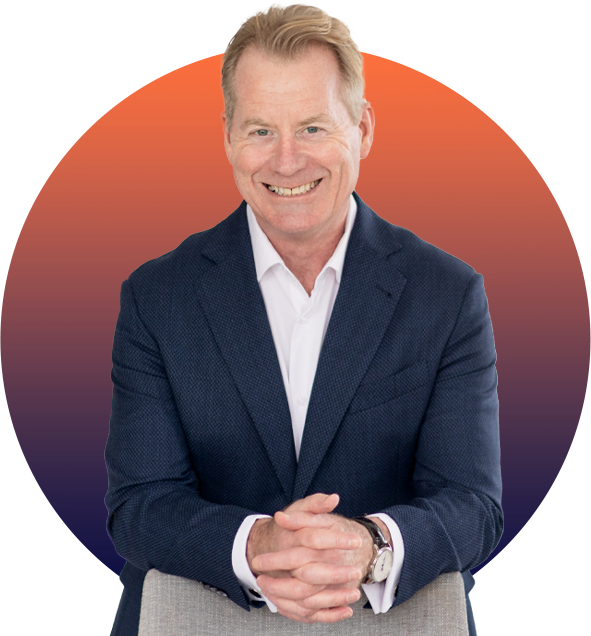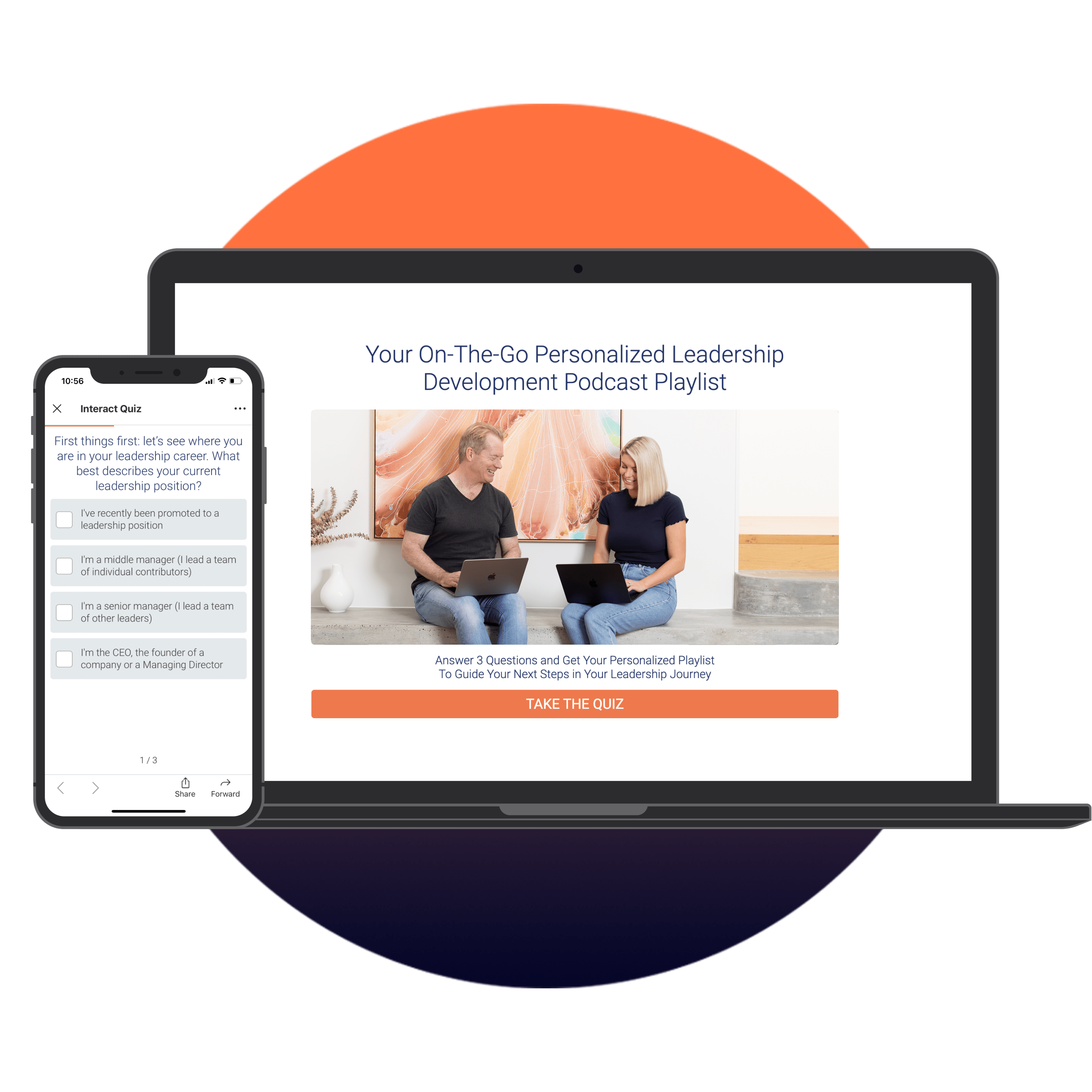With Martin G. Moore

The amount of disruption, challenge, and uncertainty we’ve dealt with in the past six months has tested us all.
Who is committed to coming out the other side better for the experience?
This episode illuminates the road to true resilience, as we tap into the experiences of those who’ve come before us. How do we cope when everything appears hopeless, and the barriers seem insurmountable?
The Stockdale Paradox is a roadmap to surviving even the most difficult and gruelling circumstances, and fits perfectly into our current paradigm as we look to an uncertain global future.
Generate Your Free
Personalized Leadership Development Podcast Playlist

As a leader, it’s essential to constantly develop and improve your leadership skills to stay ahead of the game.
That’s why I’ve created a 3-question quiz that’ll give you a free personalized podcast playlist tailored to where you are right now in your leadership career!
Take the 30-second quiz now to get your on-the-go playlist 👇
Transcript
Hey there, and welcome to Episode 107 of the No Bullsh!t Leadership podcast. This week’s episode: Resilience, Faith and Optimism: The Stockdale Paradox. This week I’ve decided to revisit resilience with a slightly different lens. The disruption, challenge, and uncertainty we’ve dealt with in the past six months or so has tested all of us, but who among us will commit to coming out the other side of this better for the experience? This episode illuminates the road to true resilience. As we tap into the experiences of those who’ve come before us. How do we cope when everything appears hopeless, and the barriers seem insurmountable? The Stockdale Paradox is a roadmap to surviving even the most difficult and gruelling of circumstances. It fits perfectly into our current paradigm, as we look to an uncertain global future. For those of us who choose to lead, this is incredibly important because it needs to become just another part of our day jobs. So we’re going to start with a look at what the Stockdale Paradox actually is. I’ll then tie that in with some insights from Viktor Frankl. We’ll look at the parallels with our current circumstances and I’ll finish with a few ideas for building resilience in a way that will help you to embrace it in all its ugliness. So let’s get into it.
The other day, I came across a great quote from Morgan Housel. I think it really captures the essence of what resilience is. He says “Optimism is usually defined as a belief that things will go well, but that’s incomplete. Sensible optimism is the belief that the odds are in your favour and over time, things will balance out to a good outcome, even if what happens in between is filled with misery. And in fact, you know, it will be filled with misery. You can be optimistic that the longterm growth trajectory is up and to the right, but equally sure that the road between now and then is filled with landmines and always will be. Those two things are not mutually exclusive”. That’s a great quote. And in fact, as we’ll find out shortly, it’s almost essential that we go through the pain, misery and uncertainty to get to any outcome that we so desperately crave.
One of the most gripping accounts of this was chronicled by Admiral James Stockdale in his book ‘In Love and War’. Some of you may have also come across it in Jim Collins, leadership classic, Good to Great. Now Stockdale lived for eight years as a prisoner of war in Hanoi during the Vietnam war. He was tortured repeatedly and he lived through incredible deprivation, but he found the strength of character to lead the other prisoners in a way that ensured as many survived the ordeal as possible. How did Stockdale do this? Well, a clue comes when he describes who made it out of the camp and who didn’t. The ones who didn’t make it out, surprisingly, were the optimists. They would hope and believe that they’d be out by Christmas, but then Christmas would come and go. Then they’d hope and believe that they’d be out by Easter and Easter would come and go. And then they’d hope they’d be out by next Christmas. As Stockdale puts it, eventually they just died of a broken heart.
The ones who made it out had a completely different mindset – “I know and believe that one day I’ll get out. But just for now I have to deal with the brutal reality of where I am, and I have to focus on how to survive today.” So the Stockdale Paradox as it’s called, is a powerful lesson in resilience. As Jim Stockdale says, “You must never confuse faith that you will prevail in the end, which you can never afford to lose, with the discipline to confront the most brutal facts of your current reality, whatever they might be”. So the optimists became discouraged because they were waiting for an external event. It completely changed the mental frame with which they approached each day.
Let’s just take a quick look at Viktor Frankl’s experience. Viktor Frankl was interred in a Nazi concentration camp during the Second World War. During that time, he lost his wife, both parents and his brother in those death camps. Frankl details this experience in a very philosophical way in his classic book, ‘Man’s Search for Meaning’. Now if you haven’t read it yet it’s worth putting on your list. It’s a pretty quick read. But because Frankl held doctorates in both medicine and philosophy, he was able to apply a very clinical, observational perspective to his suffering. His ability to survive and relate this in such a methodical and structured way is a little gem of wisdom for anyone who cares to look at it. Now, Frankl uses the term “tragic optimism”. Similar to the Stockdale Paradox, tragic optimism is about remaining optimistic while embracing three harsh realities – pain, guilt, and death. To deal with these, Frankl devised a clinical process which he calls logotherapy. To deal with the pain, you need to learn how to turn suffering into human achievement. To deal with the guilt, you need to learn how to change yourself for the better and to deal with the death, you need to learn how to make it the driving force that pushes you to take responsible action.
This is all mindset, and the approach you choose, in any given situation. Now you can see the common links between this and the Stockdale Paradox. From all of this, I like to use two terms to describe the different types of optimism. We have naive optimism and we have pragmatic optimism. The naive optimists are the ones that hope for unrealistic things without having the grit and determination to ever get to see them. But pragmatic optimists see the world for what it is. They believe in the right outcomes, and they have the discipline to push through any temporal pain, in order to get to the other side.
What’s this got to do with us as leaders in our current circumstances? Well, we know that resilience is critical to leading, and anyone can hold the helm when the sea is calm. I have a belief that your career success is determined by a combination of three basic capabilities: IQ, EQ, and AQ. Now a lot is said about IQ, your natural intelligence, and EQ your emotional intelligence but AQ, your adversity quotient, is how well you deal with adversity and how resilient you are. This is your ability to deal with setbacks, disappointments, and crises, which will inevitably come your way during life and your career. But let’s talk success principles first. I worked out a number of years ago, that there are barriers to success. Life is designed this way on purpose.
Now, in case you haven’t worked this out yet, I’m going to let you in on a quite poorly, understood secret. There is no such thing as luck. Everyone gets an equal share of good and bad luck. Those who are successful learn to ride through their bad luck without becoming discouraged and without giving up. They are also the ones who capitalise boldly on their good luck when it happens to turn up. When the obstacles are the toughest and seemingly the most insurmountable that’s when successful people love it the most. I genuinely and truly love crashing into big obstacles. You know why? Because that’s where most other people turn back. These are the barriers to success, and it tells me that I’m on the right track. Like I said, it’s not luck.
Frank Shorter, the American marathon runner who won the Olympic gold medal in 1972 in Munich said, “You don’t run 26 miles at five minutes per mile pace on good looks and a secret recipe”. That’s a guy who did the work.
So how does this all apply to these Covid times? Well, some of you are in businesses that are absolutely booming at the moment, while others of you have lost your jobs. I know some of you have businesses that have folded or are in extreme distress. Yet you have to lead through this, regardless. Now, the naive optimists are sitting around waiting for a vaccine. I hope it comes so that we can just go back to normal. Until then, we’ll just hope it’s available by Christmas or Easter or next Christmas. But what are the pragmatic optimists doing? They have ultimate faith that we’ll work it out. And that there’ll probably be some form of prevention or treatment options sometime in the future. But they’re not relying on that. They’re saying something slightly different. Let’s get on with it and work out how to live in the current circumstances. How do we need to adapt? They’re working out how to manage an environment of changed social behaviour and consumer demand. They’re working out how to make supply chains more robust as the global economy shifts.
Now the USA, China and Europe are diverging. And this was happening well before the pandemic hit, thing is now, it’s just been accelerated somewhat. But the pragmatic optimists are dealing with social costs and fallout and working out how to support the people they lead. They’re taking a balanced view of the problem with the faith that they will eventually prevail while dealing with the most brutal facts of the current reality. And they’re just getting on with it.
Let’s look at some tips for resilience, faith, and optimism. You can actually work on the three component parts of the Stockdale Paradox very directly. So first of all, we have the ability to hold faith and to have no doubt whatsoever that you will prevail in the end. You basically need to know that you can handle whatever comes. And part of this is building up a base of evidence. Look back at the situations in the past where you’ve demonstrated this. You’re still here, right? What would convince you that you might not prevail other than fear of the unknown? Because history tells you that you should. The second part is the belief that not only will you survive, but that the pain you’re going through will be a defining moment and that it will shape who you are to prepare you for what’s to come beyond the current circumstances.
This taps into meaning and purpose. The suffering for its own sake is limited in its appeal, trust me. But suffering for a reason, produces the best from us. This creates a completely different mindset as you go through any struggles. Many times over the years, I’ve said, “This is going to be an awesome story one day for my book”. No doubt, what we’re going through now, will be part of my future story as well. The third piece of the Stockdale Paradox is to simultaniously confront the most brutal facts of your circumstances. You’ve got shit to deal with right now. And in Stockdale’s terms, you won’t do that by dreaming of your release date. So put your head down, and work out how to handle what you’re going through now, no matter how desperate or how ugly. You should have confidence in this and your ability to pull it off, because it’s likely you’ve already proven over and over again during your life that you can actually handle a hell of a lot more than you think.
Now here’s a few things that would just make it easy for you to handle your current pandemic circumstances so that you come out the other end stronger than you went in. I’ve got three little tips here. Number one, don’t just hunker down. This concept of, ‘I hope it all returns to normal soon. And until then, I’ll just try and wait it out’ is not going to hold you in good stead. It’s going to get old really fast, and I’m seeing many of my colleagues and clients going through this as we speak. If you’re resilient and you can work out how to take a few calculated risks, this is the perfect opportunity for you to steal a march on your competitors. Just remember that where there’s great uncertainty, there’s also great opportunity. So know that you’ll survive this and come out the other end stronger, but don’t wait for an external intervention. Make sure you have the worst case scenario covered. What if the problem is here indefinitely, how do I manage to deal with this on a daily basis?
The second little tip is to scope the problem right down. Only deal with the things you can control. Don’t waste any time and energy on things you can’t ultimately influence. Retaining your internal locus of control is absolutely critical. There’s a great expression, although I can’t quite remember where it originated, but you want to have the courage to change the things you can change, the composure to accept the things you can’t change and the wisdom to know the difference.
The third little tip is try to maintain your perspective. In the overall scheme of things, how bad is this, really? Even an existential crisis, like a business failure or a job loss can provide more positives than negatives. There are endless stories of people who built great businesses and then lost it all. But what they learned from the experience of that first failure enabled them to come back better for the experience and to build something even bigger and even more enduring. Never underestimate the value of the adversity you’re going through in shaping your future path. And that’s where the faith comes into play. Like everything in life, this too shall pass. If you concentrate on building your resilience through pragmatic optimism, you’ll not only find that you come out the other end of this with a great future trajectory, but you might even find it within yourself to embrace the current circumstances. As a leader, that’s what your people will be looking for you to do, so try not to let them down.
Alright, that brings us to the end of Episode 107. Thanks so much for joining us, and remember at Your CEO Mentor, our purpose is to improve the quality of leaders globally, so please take a few minutes to share this with your network, or if you’re on Apple, rate and review the podcast. I’m really looking forward to next week’s episode. Now, you know, I’m not afraid to take on the big issues. So as I’m watching the ongoing litany of poor personal choices that CEOs and executives are making, I’m going to have a crack at the tricky subject of Workplace Romances.
Until then, I know you’ll take every opportunity you can, to be a No Bullsh!t Leader.
RESOURCES AND RELATED TOPICS:
Explore other podcast episodes – Here
Take our FREE Level Up Leadership Masterclass – Start now
Leadership Beyond the Theory- Learn More
YOUR SUPPORT MATTERS
Here’s how you can make a difference:
Subscribe to the No Bullsh!t Leadership podcast
Leave us a review on Apple Podcasts
Repost this episode to your social media
Share your favourite episodes with your leadership network
Tag us in your next post and use the hashtag #nobsleadership


